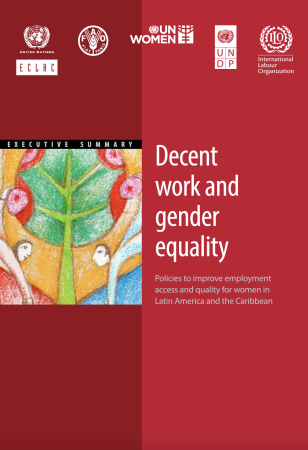Decent Work and Gender Equality

Decent Work and Gender Equality
June 25, 2013
This report was prepared collaboratively by the participating agencies. Of particular value were the proposals presented and prior discussions held by the technical teams, the guest specialists and the meetings organized to consult with governments, unions and employers’ organizations, as well as with women’s organizations in the region.
During 2012, in addition to a meeting of experts, seven regional consultation meetings were held at various stages of the preparation of this document, with the support of the Millennium Development Goals Achievement Fund. A total of 11 studies were specially prepared to enhance this report, dealing with specific aspects such as women’s working day, the situation of young women, labour markets and employment policies in different regions and countries. These studies will be published online at a later date.
This regional report has four chapters. The first examines the relationship between development and gender equality in light of the recent economic situation and the performance of the region’s countries as regards the role of women in the labour market.
Particular attention is paid to female workforce participation, the type and quality of jobs available to women, the gender unemployment gap, underemployment, the sectoral distribution of employed women, social security coverage, informal work, total workingtime and gender income gaps.
The second chapter looks at the effects in the region of gender discrimination, which translates into inequality and social exclusion. Discrimination starts with the contribution women make to the functioning of their families and of society through domestic tasks and family management, which is not recognized in national accounts or by society.
The evidence is that poverty is becoming increasingly feminized in the region. Women have to cope with income poverty, but also with time poverty, and indigenous and Afro-descendent workers are the worst affected. A great many women are employed in domestic work, an occupation in which the lack of decent work is especially acute.
Despite the huge strides that women are taking in the labour market, there is still deep-rooted cultural prejudice and discrimination against female labour market participation in some of the region’s countries.
The third chapter analyses public policies and initiatives for promoting employment and the conditions women need to enter and remain in the labour market. It examines the institutional underpinnings, mainstreaming, financing and oversight of these policies: How is a gender policy created? What resources are used? Which actors are involved?
The role of unions and employers is discussed in relation to the formulation of policies and to social policy and its impact on women’s empowerment.
The report concludes with a fourth chapter setting out some recommendations to support governments, employers’ and workers’ organizations and women’s movements in their efforts to build policies to improve employment access and job quality in their respective countries.

 Locations
Locations




